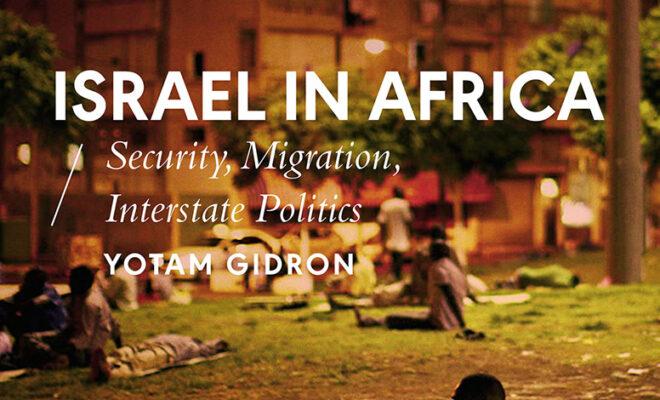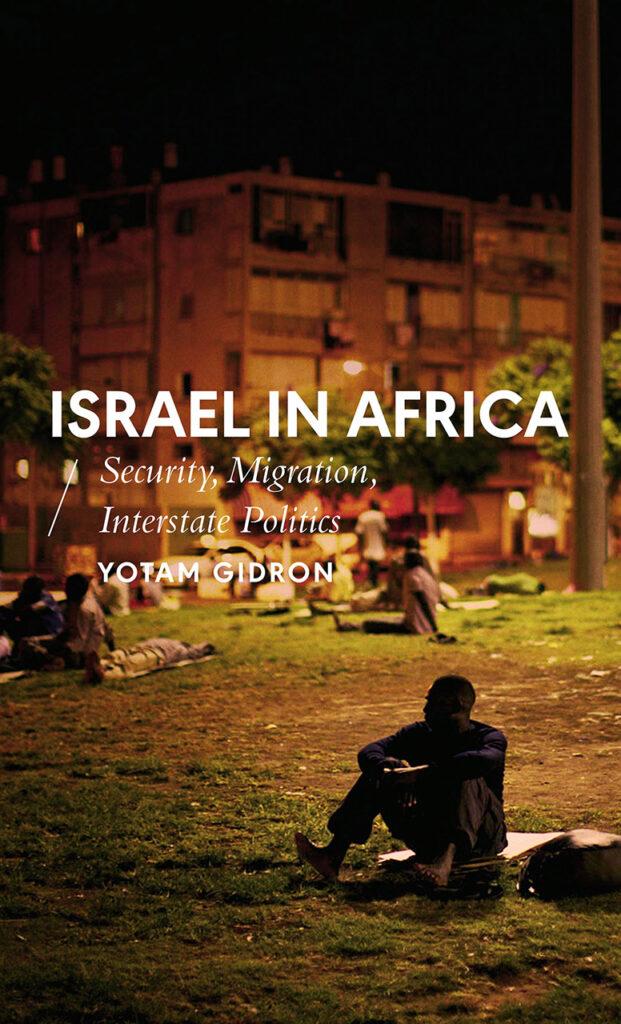
Debating Ideas is a new section that aims to reflect the values and editorial ethos of the African Arguments book series, publishing engaged, often radical, scholarship, original and activist writing from within the African continent and beyond. It will offer debates and engagements, contexts and controversies, and reviews and responses flowing from the African Arguments books.
This is the second review in a four-part debate series about Israel’s foreign policy in Africa.

Yotam Gidron’s Israel in Africa is an important piece of scholarship. The book fills intellectual gaps in the field of African international relations in two significant respects. First, it provides an up-to-date accounting of Israeli engagement on the continent, capturing both historical trends and more recent developments during Benjamin Netanyahu’s second stint as Prime Minister. Second, Gidron offers us insight into a type of external actor in Africa too often ignored in discussions of African international relations: middle or medium sized powers, whose footprint is no doubt dwarfed by those of larger states, but remain significant political agents in African affairs.
Israel in Africa is also a timely contribution. The Saudi-Emirati intervention in Yemen in 2015 ushered in a new, if somewhat familiar era in Africa–Middle East relations. Propelled by escalating inter-state competition in their own region, the Gulf states and Turkey expanded their engagement on the African continent (particularly in the Horn) with the goal of protecting core security interests and seizing new economic opportunities. Much has been written in recent years about this dynamic, with a focus on the interests of key players and the varied implications of their activity.[1] Yet Israel has largely been ignored in this discussion, despite its military, economic, and political weight in the Middle East, and as Gidron shows, its long history of engagement across Africa.
The price of this analytical blind spot was well-illustrated in February 2020, after a historic but controversial meeting in Uganda between Netanyahu and the head of Sudan’s Sovereign Council, Abdel Fattah al-Burhan. Much of the public commentary on this moment struggled to contextual it, interpret its drivers, and come to any reasoned assessment of its impact – precisely because we have lacked an updated and empirically grounded analysis of Israel’s engagement in Africa. It is exactly this vacuum that Israel in Africa so ably fills.
Israel in Africa has other key merits. Gidron’s contribution is highly readable, well-organized, balanced, and packed with fascinating historical detail. On this last point, Gidron’s analysis of the years 1957–66 – what has been referred to as the “honeymoon” or “golden age” in African–Israeli diplomatic relations – will be particularly illuminating to those unfamiliar with Israel–Africa ties. The book is also refreshing in that it takes African agency seriously, with chapter four chronicling the myriad incentives African states have had to expand ties with Israel.
Israel in Africa’s key contribution, however, is that it captures the historical continuities and discontinuities in Israel’s relations with the continent. The key argument is succinctly summarized on p. 155, where Gidron writes “It is not African views of Israel or Israeli views of Africa that have changed radically over the years so much as the actors and institutions that make up Israel in Africa and how they relate to one another.” What has stayed the same, the book shows, are the security logics that have often bound Israel and Africa together and at times pulled them apart: the Arab–Israeli rivalry, the issue of Palestine, Iran, migration management, and the long-standing need for fragile African regimes to secure patronage. By contrast, what has changed over the decades is that the civilian institutions of the Israeli state, and the Israeli state itself, have become far less central to how Israel engages Africa. Gidron’s discussion of the surprisingly limited scope of current Israeli official development assistance to Africa is particularly revealing in this regard. Into the breach have stepped a range of non-state actors, including private corporations and commercial networks closely tied to the Israeli security state, religious groups, and Israeli NGOs. To the extent that the Israeli state is involved in shaping Israel–Africa ties, it is largely the Israeli intelligence services.
The consequence of this historical discontinuity in the structure of Israeli engagement in Africa is its increasing informality and opaqueness. Gidron regards this development with obvious trepidation. In conjunction with the Global War on Terrorism and other macro-level forces, the current iteration of Israel in Africa has enabled autocrats, just as it has facilitated the subversion of Israeli law and institutions on matters of migration. Although it is unclear whether situating Israel’s Africa policy in the hands of public actors would yield better outcomes for either Africa or Israel, there can be little doubt that there are costs to a foreign policy conducted in the shadows.
Across the board, then, Israel in Africa is an excellent book that deserves wide-readership. Like all books on important topics, there are several areas that require more treatment. There are three issues in particular that should be mentioned, the first having to do with framing, the second and third with questions of empirics.
First, what is the broader conceptual relevance of Israel in Africa? Gidron’s book is written for both a scholarly audience and popular consumption; striking the right balance between these two imperatives is no easy feat. Perhaps this is why the book does not explicitly clarify what Israel’s relations with Africa teaches us about the broader trends in Israel’s international affairs, or reflect on how similar to, and different from, Israel’s Africa relations are to that of other middle powers with concerns on the continent. Situating Israel in Africa within these broader debates would go some way in clarifying the book’s contributions while further broadening its audience.
Second, there is much to unpack with respect to the triangular relationship between Israel, Africa, and the US, particularly in light of the close diplomatic partnership between the Trump administration and Prime Minister Netanyahu. Gidron convincingly argues that African states often regard Israel as important conduit for influence in Washington. Less clear, however, is whether this perception reflects reality. While scholars like John Mearsheimer and Stephen Walt would have us believe Israel has a powerful ability to shape US foreign policy, it’s likely this influence is uneven across policy spaces.[2] And with respect to Africa, it is hard to think of a specific instance in recent years in which Israel has played a decisive role in moving Washington’s position on a particular Africa-related matter.
Finally, there is the issue of other external powers in Africa, and in particular non-Middle Eastern players like China, Russia, and India, and the ways in which Israel engages these increasingly important actors on the continent and to what effect. Given the expanding density of external activity on the continent, and Israel’s notable bilateral economic relationship with China in particular, it is this question that may well define Israel in Africa in the decades to come. Perhaps this issue will be the subject of future work by Gidron, and given his debut book, we should all look forward to this contributions and others.
End Notes:
[1]Harry Verhoeven, “The Gulf and the Horn: Changing Geographies of Security Interdependence and Competing Visions of Regional Order,” Civil Wars 20, no. 3 (July 3, 2018): 333–57; Brendon J. Cannon and Federico Donelli, “Asymmetric Alliances and High Polarity: Evaluating Regional Security Complexes in the Middle East and Horn of Africa,” Third World Quarterly 41, no. 3 (March 3, 2020): 505–24.
[2]John J. Mearsheimer and Stephen Walt, Israel Lobby and U.S. Foreign Policy, 1st edition (New York: FSG Adult, 2008).



